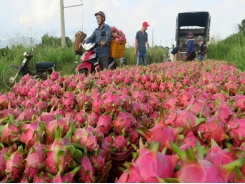Mekong Delta farmers switch to other crops in response to climate change

More farmers in the Mekong Delta have restructured their crop cultivation to adapt to the effects of climate change.
Harvesting cucumbers in the Cửu Long (Mekong) Delta province of Trà Vinh.
The delta, the country’s largest rice, fruit and seafood producer, has faced severe drought and saline intrusion in recent years and local authorities have encouraged farmers to switch to suitable farming models.
Many rice farmers in the delta’s coastal areas, which are affected by saltwater intrusion in the dry season, have switched completely to other crops, or rotated growing rice in the rainy season and cultivating other crops or aquaculture in the dry season on the same field.
In Sóc Trăng Province, the shrimp-rice rotation model has provided sustainable income for farmers in Mỹ Xuyên District.
Tạ Minh Bạch, who is implementing the shrimp-rice rotation model in Mỹ Xuyên’s Hòa Tú 1 Commune, said he harvests an average of 1.5 tonnes of shrimp each crop and 3 tonnes of paddy each crop.
“The shrimp-rice rotation model does not provide very high profit but is sustainable,” he said.
Rice and shrimp produce under the shrimp-rice rotation model is clean, as farmers use few chemicals to cultivate rice and shrimp.
In Cần Thơ City, many rice farmers have switched to fruit, vegetables or flowers as the crops offer two to four times higher profit than rice, according to the city’s Department of Agriculture and Rural Development.
Last year, farmers in the city turned more than 1,200ha of rice into areas growing fruit trees, increasing the city’s fruit growing area to 19,533ha.
The city’s farmers are growing more than 9,200ha of vegetables and other short–term crops, up 2,491ha against the same period last year.
The city’s department is encouraging farmers to restructure their crops toward increased value, quality and sustainable development.
Transfer of techniques
The delta’s 12 provinces and Cần Thơ City have promoted transfer of advanced farming techniques and effective models to help farmers improve production efficiency.
Rice farmers in the delta have applied smart rice farming and alternate wet and dry rice farming to improve yields and cut costs. They have also switched to more high-quality rice varieties to meet export demand.
In the ongoing 2019-20 winter-spring rice, specialty rice varieties and fragrant rice varieties account for 45 per cent of the delta’s total rice farming area, up 12.6 per cent against the 2018-19 winter-spring rice, according to the Ministry of Agriculture and Rural Development.
In Tiền Giang Province, nearly 60 per cent of vegetable growing areas have applied efficient irrigation systems, up 14 per cent against last year, according to the province’s Department of Agriculture and Rural Development.
The province has 80 poly-green houses with an area of 500-1,000 sq.m each and more than 100 net houses with a total area of 10ha. The houses grow various kinds of vegetables and honeydew melon.
The cultivation of vegetables in the dry season has offered farmers in Tiền Giang a profit of VNĐ21.5-122.5 million (US$900-5,200)per hectare a crop, up 1.1-1.6 times higher than growing rice.
Đinh Thị Phương Khanh, deputy director of the Long An Province Department of Agriculture and Rural Development, said the province was applying advanced techniques to growing key agricultural produce.
The province helped farmers apply good agricultural practices like VietGAP and GlobalGAP standards.
Bến Tre Province, which is the country’s largest coconut producer, has developed value chains for its coconut to improve yield, output and income.
Huỳnh Quang Đức, deputy director of the Bến Tre Department of Agriculture and Rural Development, said the province’s value chains were focusing on growing coconuts under the organic standards of the US, Japan and the EU to meet export standard requirements.
The Bến Tre Agriculture Extension Centre in co-operation with localities and companies has established 48 co-operative groups and 17 co-operatives, with 4,100 members. The members grow a total of 2,964ha of coconut.
However, the delta is facing difficulties in restructuring crop cultivation, including unstable outlets and insufficient infrastructure.
In Sóc Trăng Province’s Cù Lao Dung District, which has the largest sugarcane cultivation in the delta, local authorities have instructed farmers to switch to other crops because of the declining price of sugarcane in recent years.
Trần Thanh Tuấn, head of the Cù Lao Dung Bureau of Agriculture and Rural Development, said the restructuring of agricultural production in the district had faced difficulties, especially outlet guarantees for farmers.
The co-operation between co-operatives and companies is also still limited as companies are not interested in investing in the islet district because of transport difficulties, according to Tuấn.
The district has limited resources to support farmers to restructure crop cultivation.
The district sugarcane area has fallen from 6,500ha in 2016 to 2,600ha. The district plans to reduce an additional 680ha of sugarcane this year, turning to grow high-value crops like longan, mango, grapefruit, coconut and vegetables.
Có thể bạn quan tâm
Phần mềm

Phối trộn thức ăn chăn nuôi

Pha dung dịch thủy canh

Định mức cho tôm ăn

Phối trộn phân bón NPK

Xác định tỷ lệ tôm sống

Chuyển đổi đơn vị phân bón

Xác định công suất sục khí

Chuyển đổi đơn vị tôm

Tính diện tích nhà kính

Tính thể tích ao hồ



 Mekong Delta provinces expect good summer-autumn rice crop
Mekong Delta provinces expect good summer-autumn rice crop  Coronavirus hits Vietnam’s fruit exports to biggest market,…
Coronavirus hits Vietnam’s fruit exports to biggest market,…